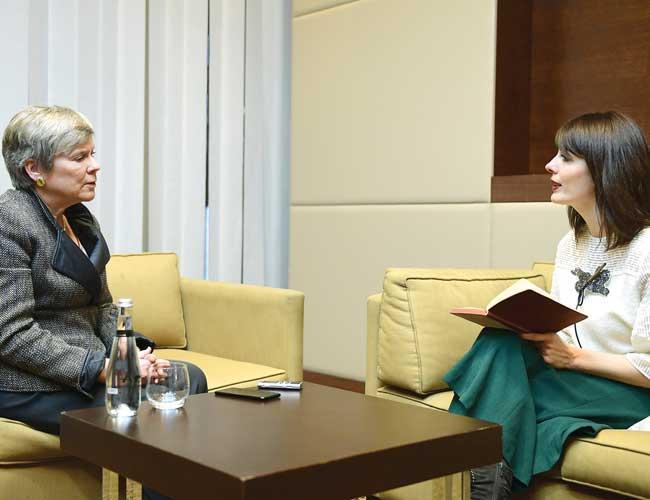
Turkey is among the NATO members “most affected by terror attacks” and NATO fully recognizes the threat posed to it, Deputy Secretary General Rose Gottemoeller has told the Hürriyet Daily News in Ankara.
“Turkey has really suffered from terrorism in recent years and has a very serious problem. It is among the NATO allies that suffer the most attacks in recent years and we do recognize that fully,” Gottemoeller said after talks in the Turkish capital on Jan. 22.
She also noted that “proportionality and international law” should be the parameters that “Operation Olive Branch” focuses on as the Turkish military engages in Syria’s Afrin province.
The operation topped the agenda in all her meetings in Ankara at the Foreign Ministry, the Defense Ministry and the Chief of Staff, Gottemoeller said.
In the talks she heard “very good messages” from Turkish colleagues about “respect for the territorial integrity and sovereignty of Syria,” Gottemoeller added, noting that similar messages were given by the president and the prime minister.
“Because NATO is an institution that stands for the rule of international law, and because Turkey is a long-standing member of the alliance, we are very glad that these messages are coming from the highest level of the Turkish government,” she said.
President Recep Tayyip Erdoğan said on Jan. 22 that the Afrin operation “will be limited in time and scope.”
Questioned about Erdoğan’s recent criticism of NATO for “failing to support Turkey” regarding the threat posed by Syrian Kurdish fighters across its southern border in Syria, Gottemoeller emphasized that the alliance is not physically present in Syria.
“We are not part of the operations that have been taking place in Syria in recent years. We are, of course, a member of the global coalition to fight [the Islamic State of Iraq and the Levant] ISIL and in that context we are active in training activities in Iraq,” she said.
Although the anti-ISIL coalition is close to defeating the group in Iraq and Syria, military capacities such as the Airborne Early Warning and Control Systems (AWACS) provided by NATO as part of the anti-ISIL fight remain in place and will continue, Gottemoeller added.
“That is a long-standing and well-established operation. AWACS are providing surveillance not only over Turkish airspace but also providing some surveillance capacity and capability, to conduct what we call air traffic control operations in Iraq too. So there are some very important activities that are in place and will continue,” she said.
Asked if continued tension between Washington and Ankara could negatively influence ongoing cooperation within NATO, Gottemoeller said the alliance is a “big family.”
“It works closely together and must work closely together because that is the only way any decision made in NATO can go through a consensus,” she said, describing Turkey as a “full member of the alliance, engaged in every decision.”
“It is very important to remember that as in any big family there are sometimes going to be family disagreements, but the important thing to recognize is each ally has an equal seat at the table in decision-making. They have an equal right to say ‘no’ when they don’t want something to happen. We respect Turkey’s role in the alliance very much and value it very much,” she said.
Touching on Turkey’s controversial purchase of Russian S-400 anti-missile defense systems, Gottemoeller said NATO “respects the decisions” that its members make about all weapons purchases.
“NATO does not really determine what decisions its allies will make on weapons purchases. What NATO really focuses on is maintaining an effective defense for all allies. One of the points that we have been keen to underscore is that we see interoperability as being very important. We can best defend our allies if our systems are able to work together to provide mutual deterrence and mutual defense. These are some issues that countries need to consider when they make weapons purchases, but in terms of each ally making its own decisions NATO does not dictate those decisions,” she added.
Turkey’s decision to buy the Russian S-400 systems in a $2 billion deal has raised the eyebrows of other NATO members, concerned about their inter-operability with the alliance’s other systems.